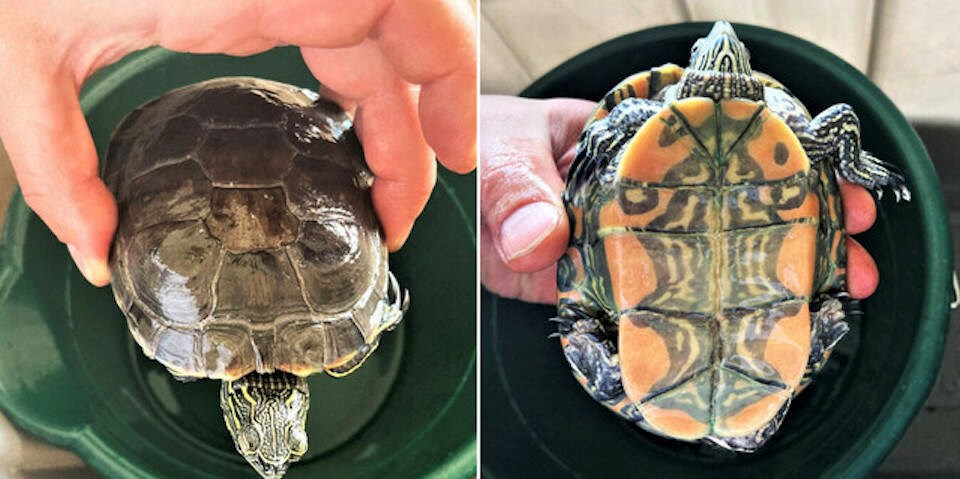A Kelowna woman has been fined after she was caught in a B.C. Conservation Officer Service sting operation trying to sell an “at-risk” western painted turtle.
Spouses Monica Skublen and Dwayne Skublen were both charged under the Wildlife Act in March with the unlawful possession of live wildlife and trafficking in wildlife. After Monica Skublen pleaded guilty to unlawful possession, the other charges were dropped.
The charges stem from a complaint to the Conservation Officer Service in March 2022, after a person noticed an ad in the classifieds on the Castanet website.
The ad read: “Michelangelo – Aquatic turtle for sale to good home.” A price of $250 was listed.
A conservation officer went “undercover,” reaching out to the seller on April 1, 2022. The officer spoke with Dwayne Skublen, who said a friend had found the turtle in their garden nine years prior, and Dwayne had given it to his wife, Monica, as a birthday present.
The officer then spoke with Monica Skublen on the phone and told her possessing a painted turtle was not allowed, and there could be “trouble” for selling and buying it. But she said the turtle was a pet and it would be the same as selling a dog. She also said she’d had another turtle, but it had died four years prior.
Skublen agreed to meet outside a Kelowna pet store on April 3 and accept $200 for the turtle.
When she arrived, the officer once again warned Skublen about the illegality of possessing or selling the animal.
“The undercover officer told Mrs. Skublen that he had done some research and found the turtle was wildlife and what they were doing was illegal,” said Crown prosecutor Jessica Saris.
“The undercover officer told Mrs. Skublen that there could be a big fine if they were caught, or jail, and then he asked Mrs. Skublen if she still wanted to continue with the sale and she did.”
After they exchanged the turtle for the agreed-upon $200, two other conservation officers approached the Skublens at their car and informed them they were under arrest.
At the scene, Dwayne Skublen told an officer that he had been given the turtle nine years prior, and had come to understand it was illegal to possess a painted turtle in the past couple of years. He noted it was his wife’s idea to sell the turtle.
The turtle has since been taken in by the B.C. Wildfire Park in Kamloops. During its intake, staff there said the turtle was much smaller than it should have been for its age.
The western painted turtle is listed as a “species of special concern” under the Species at Risk Act. An ecosystems biologist wrote a victim impact statement in the case, noting the already limited gene pool of the species is impacted when an individual is removed from the wild and raised in captivity.
Conservation officer Ken Owens said there are only 800 to 1,000 western painted turtles in B.C., and it is the province’s only native freshwater turtle.
While the maximum penalty for possessing wildlife is up to $100,000 and a year in jail, Saris sought a $500 fine, noting Monica Skublen’s very early guilty plea in the matter.
Defence counsel Stan Tessmer sought a fine “as low as possible.” He said his client loved Michelangelo and she took good care of it over nine years.
Tessemer said Skublen was not aware the turtle was “at risk,” and she only sought payment to assure the animal would go to a good home.
Judge Michelle Daneliuk said she was “struggling” with the idea that Skublen was unaware it was illegal to possess the turtle given her husband had admitted to learning it was illegal to possess a painted turtle a couple of years earlier.
Ultimately, however, Daneliuk handed down a $350 fine.
Following sentencing, conservation officer Ken Owens said he would have liked to see a larger fine “to see it act as a deterrent to other people.”
“Every year, especially in the spring time, we are receiving calls about people going to the local ponds and possessing western painted turtles … so it does occur,” Owens said. “Hopefully something like this will prevent other people from doing this.”



